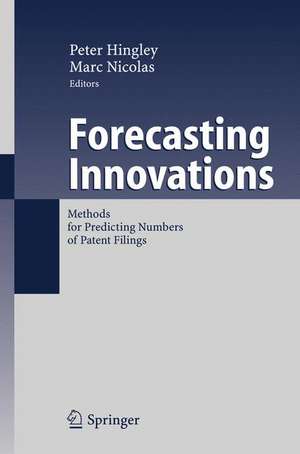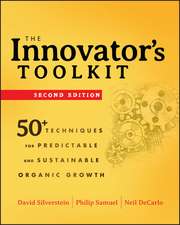Forecasting Innovations: Methods for Predicting Numbers of Patent Filings
Editat de Peter Hingley, Marc Nicolasen Limba Engleză Hardback – 6 sep 2006
| Toate formatele și edițiile | Preț | Express |
|---|---|---|
| Paperback (1) | 774.45 lei 6-8 săpt. | |
| Springer Berlin, Heidelberg – 14 oct 2010 | 774.45 lei 6-8 săpt. | |
| Hardback (1) | 640.86 lei 6-8 săpt. | |
| Springer Berlin, Heidelberg – 6 sep 2006 | 640.86 lei 6-8 săpt. |
Preț: 640.86 lei
Preț vechi: 753.95 lei
-15% Nou
Puncte Express: 961
Preț estimativ în valută:
122.72€ • 126.45$ • 102.98£
122.72€ • 126.45$ • 102.98£
Carte tipărită la comandă
Livrare economică 22 februarie-08 martie
Preluare comenzi: 021 569.72.76
Specificații
ISBN-13: 9783540359913
ISBN-10: 3540359915
Pagini: 276
Ilustrații: VIII, 268 p. 24 illus.
Dimensiuni: 155 x 235 x 23 mm
Greutate: 0.56 kg
Ediția:2006
Editura: Springer Berlin, Heidelberg
Colecția Springer
Locul publicării:Berlin, Heidelberg, Germany
ISBN-10: 3540359915
Pagini: 276
Ilustrații: VIII, 268 p. 24 illus.
Dimensiuni: 155 x 235 x 23 mm
Greutate: 0.56 kg
Ediția:2006
Editura: Springer Berlin, Heidelberg
Colecția Springer
Locul publicării:Berlin, Heidelberg, Germany
Public țintă
ResearchCuprins
Background.- A research programme for improving forecasts of patent filings.- From theory to time series.- An assessment of the comparative accuracy of time series forecasts of patent filings: the benefits of disaggregation in space or time.- Driving forces of patent applications at the European Patent Office: a sectoral approach.- Time series methods to forecast patent filings.- International patenting at the European Patent Office: aggregate, sectoral and family filings.- Micro data for macro effects.- Improving forecasting methods at the European Patent Office.
Textul de pe ultima copertă
This is a practical guide to solutions for a case study of forecasting demand for services and products in international markets - and so much more than just another listing of dry theoretical methods. Leading experts present studies on improvements to methods for forecasting numbers of incoming patent filings at the European Patent Office. Studies are presented from econometric, survey and systems theory viewpoints. A recurring theme is the extent to which it is worthwhile to break down the components of the forecasting problem into classes based on geography, technical descriptions and sub-products. The contributions are reviewed by the practitioners of the existing methods, who seek to establish how to make use of the results and discover that it may not always be wise to put complete trust in established regression approaches. Along the road the reader will learn more about the patent system, debatably the best way for society to harness the forces of human invention.













